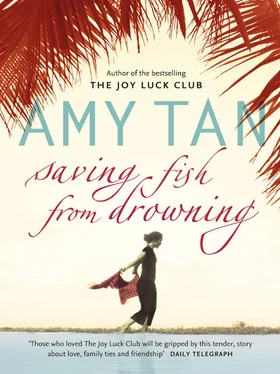WHEN THE FUNERAL finally happened on December 11th, it was nearly ten days after I died, and without preservation I would have been compost. Nonetheless, many came to see and mourn me. A modest guess would be, oh, eight hundred, though I am not strictly counting. To begin, there was my Yorkshire terrier, Poochini, in the front row, prostrate, head over paws, sighing through the numerous eulogies. Beside him was my good friend Harry Bailley, giving him the occasional piece of desiccated liver. Harry had offered to adopt Poochini, and my executor readily agreed, since Harry is, as everyone knows, that famous British dog trainer on television. Perhaps you’ve seen his show— The Fido Files ? Number-one ratings, and many, many Emmy Awards. Lucky little Poochini.
And the mayor came—did I mention?—and stayed at least ten minutes, which may not sound long, but he goes to many places in a day and spends far less time at most. The board members and staff of the Asian Art Museum also came to pay respects, nearly all of them, as did the docents I trained, years’ and years’ worth, plus the people who had signed up for the Burma Road trip. There were also my three tenants—the troublesome one, as well—and my darling repeat customers and the daily browsers, plus Roger, my FedEx man; Thieu, my Vietnamese manicurist; Luc, my gay haircolorist; Bobo, my gay Brazilian housekeeper; and most surprising to say, Najib, the Lebanese grocer from my corner market on Russian Hill, who called me “dearie” for twenty-seven years but never gave me a discount, not even when the fruit had gone overripe. By the way, I am not mentioning people in any order of importance. This is simply how it is coming to me.
Now that I think of it, I would estimate that more than eight hundred people were there. The auditorium at the de Young Museum was crowded beyond belief , and hundreds spilled into the halls, where closed-circuit television monitors beamed the unhappy proceedings. It was a Monday morning, when the museum was usually closed, but a number of out-of-towners on Tea Garden Drive saw the funeral as a fine opportunity to sneak into the current exhibit, Silk Road Treasures from the Aurel Stein Expeditions , a testimony, in my opinion, to British Imperial plundering at the height of cupidity. When guards turned the interlopers away from the exhibits, they wandered over to my funeral fête, morbidly lured by copies of various obituaries that lay next to the guest book. Most of the papers gave the same hodgepodge of facts: “Born in Shanghai … Fled China with her family as a young girl in 1949 … An alumna of Mills College and guest lecturer there, in art history … Proprietor of The Immortals … Board member of many organizations …” Then came a long list of worthy causes for which I was described as a devoted and generous donor: this league and that society, for Asian seniors and Chinese orphans, for the poor, the ill, and the disabled, for the abused, the illiterate, the hungry, and the mentally ill. There was an account of my delight in the arts and the substantial amounts I had given to fund artist colonies, the Youth Orchestra with the San Francisco Symphony, and the Asian Art Museum, the location of my funeral, the major recipient of my lagniappes and largesse, before and after death which enthusiastically offered the unusual venue for my funeral, the de Young, in which the Asian museum was housed.
Reading the roster of my achievements, I should have been bursting with pride. Instead, it struck me as nonsensical. I heard a roar of voices coming from every bit of chatter from every dinner, luncheon, and gala I had ever attended. I saw a blur of names in thick, glossy programs, my own displayed in “Archangels,” below those in the fewer-numbered and more favored “Inner Sanctum,” to which that Yang boy, the Stanford dropout, always seemed to belong. Nothing filled me with the satisfaction I believed I would have at the end of my life. I could not say to myself: “That is where I was most special, where I was most important, and that is enough for a lifetime.” I felt like a rich vagabond who had passed through the world, paving my way with gold fairy dust, then realizing too late that the path disintegrated as soon as I passed over it.
As to whom I had left behind, the obituary said, “There are no survivors,” which is what is said of airplane crashes. And it was sadly true, all my family was gone—my father, of a heart attack; one brother, of alcoholic cirrhosis, although I was not supposed to mention that; the other brother a victim of a road-rage accident; and my mother, who passed from life before I could know her. I don’t count my stepmother, Sweet Ma, who is still alive, but the less said about her the better.
The choice of an open-casket ceremony was my fault, the result of an unfortunate aside I had made to a group of friends at a tea-tasting party I had hosted at my gallery the previous July. You see, earlier that week I had received a ship’s container of fantastic items I found in the countryside of Hubei Province. Among them was a two-hundred-year-old lacquered coffin of paulownia wood made by a eunuch singer who had performed in palace theatricals. In death, most eunuchs, except those in the upper echelons of service, were given only the most perfunctory of burials, without ceremony, since their mutilated bodies were not fit to appear before spirit tablets in the temples. In yesteryears, people rich and poor prepared for the netherworld by making their coffins long before they ceased to hear the cock crowing the new day, and the fact that this eunuch was allowed to make such a grand coffin suggested that he was someone’s pet—the prettier boys often were. Alas, this adored eunuch drowned while fishing along the Yangtze, and his body went sailing without a boat, swept away to oblivion. The eunuch’s parents, in Longgang Township, to whom his possessions had been sent, faithfully kept the coffin in a shed, in hopes that their son’s wayward corpse would one day return. The subsequent generations of this family grew impoverished by a combination of drought, extortion, and too many gifts to opera singers, all of which led to their losing face and their property. Years went by, and the new landowners would not go near the shed with the coffin, which was reputed to be haunted by a vampire eunuch. Derelict with neglect, the shed was covered with the dirt of winds, the mud of floods, and the dust of time.
In 1997, when a newly rich farmer started construction of a miniature golf course to adjoin his family’s two-story Swiss-style villa, the shed was unearthed. Amazingly, the coffin had only superficial rot and not much cracking from shrinkage; such is the quality of paulownia, which, though lightweight, is more durable than many harder woods. The exterior had more than fifty coats of black lacquer, as did its short four-legged stand. Beneath the grime, one could see that the lacquer bore whimsically painted carvings of sprites and gods and mythical beasts, as well as other magical motifs, and these were continued on the interior lid of the coffin as well. My favorite detail was a playful Tibetan spaniel on the portion of the lid that would have been opposite the corpse’s face. Having been protected from sunlight, the interior art on the lid was still exquisitely colored against the black lacquer. Neat bundles of paper lined the bottom, and I later determined them to be a short history of the intended tenant of the coffin and the same man’s unpublished poems, tributes to nature, beauty, and—most intriguing—romantic love for a lady from her youth through premature death. Well, I presume it was a lady, though one never knows with some Chinese names, does one? The coffin contained two other objects: a smaller lacquer urn with the name of the eunuch’s dog, the Tibetan spaniel, and a small ivory-rimmed box in which three calcified peas rattled about, said to be the eunuch’s manhood and its two accompaniments.
Читать дальше












